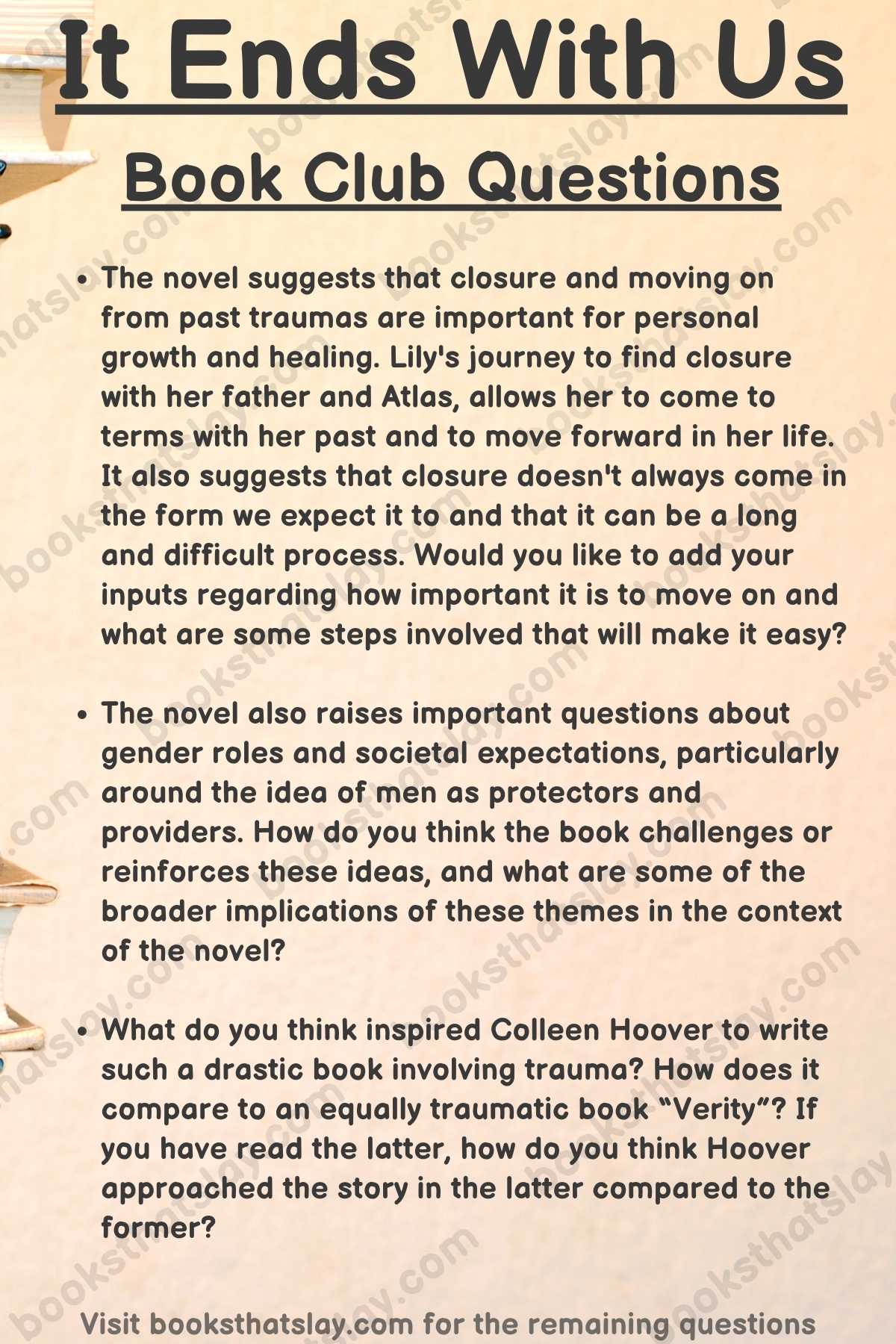10 It Ends With Us Book Club Questions
Have you ever prioritized someone else’s happiness above your own, even at great personal cost?
Lily Bloomwood does just that when she falls for Ryle Kincaid, a charming neurosurgeon with a mysterious past and a strict aversion to relationships.
As their connection deepens, she becomes determined to unravel the reasons behind his guarded heart. But when a ghost from Lily’s past reappears, her world is turned upside down, forcing her to confront the complexities of love, loss, and the devastating consequences of unhealthy relationships.
Join us as we explore the emotional depths of Colleen Hoover’s It Ends With Us. Through thought-provoking discussion questions, we’ll delve into the complexities of Lily’s choices, the nature of toxic relationships, and the enduring power of love.
Ready to explore the heart-wrenching world of It Ends With Us?
Let’s begin!
Also Read: It Ends With Us Book Review

Book Club Questions for It Ends With Us
- How does the novel portray the journey of seeking closure in relationships and past traumas? Consider Lily’s experiences with both Atlas and her father. Discuss how these relationships contribute to her personal growth and healing. Reflect on your own experiences or observations about closure—does it always manifest in the way we expect, or can it come in forms that surprise us? How does the novel suggest one might navigate the process of healing from old wounds, and what can we learn from Lily’s approach to moving forward in life?
- The statement, “No one is exclusively bad, nor is anyone exclusively good. Some are just forced to work harder at suppressing the bad,” invites us to explore the characters’ moral complexities. Discuss how this theme of moral ambiguity is portrayed through the characters of Lily, Ryle, and Atlas. How does each character manage the ‘bad’ within them? Extend this discussion to real life: How does this perspective on human nature influence our understanding of people’s actions and their capacity for change?
- Analyze the evolving dynamics between Lily and Ryle, focusing on their transition from a casual to a serious relationship. What psychological impacts might arise from their differing initial expectations and Ryle’s subsequent behavior? Discuss the cycle of love and hate that develops, and consider why such relationships can become toxic. How does the novel address the challenges of recognizing and escaping unhealthy relationship patterns, and what lessons can be drawn about maintaining emotional health and personal boundaries in relationships?
- How does the novel challenge traditional gender roles through Lily’s character and her interactions with other characters like Ryle and Atlas? Discuss the implications of portraying Lily as a strong, independent woman who defies the expectation that she needs a man to complete her. How does this portrayal contribute to the broader conversation about gender expectations in society? Conversely, does the novel reinforce any traditional gender roles through other characters or scenarios?
- The novel concludes on an ambiguous note, with Lily facing an uncertain future. Discuss how this open-ended conclusion affects your interpretation of the novel’s overall message. What are the potential benefits or drawbacks of such an ending in storytelling? How might this uncertainty mirror real-life experiences of facing new challenges? Would a more definitive resolution have altered the impact of the story, and if so, how?
- How do the traumas experienced by characters like Ryle and Atlas influence their behaviors and relationships in the story? Discuss the psychological impact of Ryle’s early childhood incident and Atlas’s experience with homelessness on their adult lives. How do these past events shape their interactions with Lily and their approaches to personal challenges? What does the novel suggest about the importance of addressing past traumas in order to build healthy relationships?
- Lily, Atlas, and even Ryle have varying levels of support throughout the novel. Examine how the presence or absence of a strong support system affects each character’s ability to cope with life’s challenges. How does Lily’s support system help her in her journey towards independence and making tough decisions? In contrast, how might Ryle’s lack of a proper support system contribute to his struggles?
- The unexpected reunion between Lily and Atlas after many years is a pivotal moment in the novel. How does this event compare to typical romantic tropes seen in literature and film? Discuss whether you find such serendipitous encounters realistic or overly dramatic. How does this scene serve the overall narrative, and what does it reveal about the enduring nature of certain relationships?
- Reflect on the quote “No one is exclusively bad, nor is anyone exclusively good. Some are just forced to work harder at suppressing the bad.” How does this philosophical idea play out through the decisions characters make in the novel? Discuss specific instances where characters have to choose between suppressing their bad traits or letting them manifest. How do these choices affect their paths and relationships with others?
- Consider Colleen Hoover’s narrative style and structure in the novel. How does her way of unfolding the story affect your understanding of and empathy for the characters? Discuss how the narrative technique, including the use of flashbacks or shifting perspectives, enhances or detracts from the themes of healing, trauma, and relationship dynamics. What impact does this have on the reader’s engagement and interpretation of the story’s deeper messages?
If you liked this set of questions, here are some other things for you to explore.